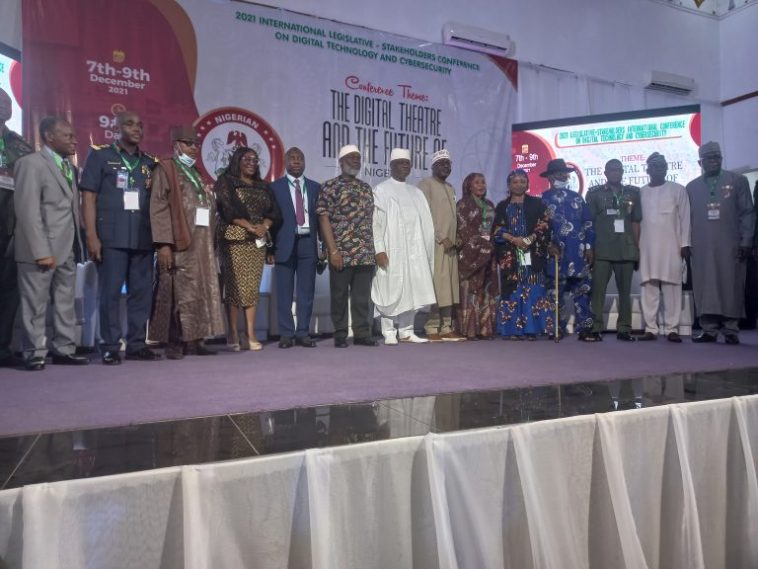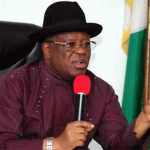The Senate has reiterated its commitment towards combating forms of cybercrime in the country through its strategic legislations and collaborations with stakeholders.
Senate President Ahmad Lawan made the commitment at the opening ceremony of the 2021 International Legislative-Stakeholders Conference on Digital Technology and Cybersecurity on Tuesday in Abuja.
Represented by Sen. Hassan Hadejia, Lawan recognised that digital technology had engendered revolutions in human activities, created new patterns and peculiarities.
He said that cybersecurity issues had emerged as a by-product of the revolution, resulting in the need to devise ways of mitigating or containing its threat.
“As a result of this, the Senate resolved to address cybercrime through its motion ‘The Growth of Digital Technology and the Challenge of Cybercrime: Urgent Need to Safeguard the Future of Nigeria’.
“We decided that the committee on ICT and Cybercrime should liaise with stakeholders on how best to protect the future, faced with threats of cybersecurity.
“Through a wide range of consultations, we should be able to identify the key issues, develop methods of addressing them, and then emerge with appropriate and sustainable conclusions and recommendations,’’ he said.
Sen. Yakubu Oseni, Chairman, Senate Committee on ICT and Cybercrime, said the effect of cybercrime was eating deep into the economy of nations globally.
According to Oseni, in Nigeria, weak systems also contribute to the challenge of cyber security because there is lag in infrastructure development, data management and digital security.
“May I reiterate that Cybersecurity is all about balancing between security and quality of life.
“Any activity geared towards keeping a safe cyber ecosystem today is, therefore, as important as life itself,’’ he sai
Oseni added that the Senate Committee has taken up engagements with various State Governments, Ministries, Departments, Agencies and private sector to articulate the gaps in ensuring safe cyber space and address them.
The Director-General of NITDA, Mr Kashifu Inuwa, said the agency was ensuring it deployed IT in developing the economy of the country.
Represented by Mr Emmmanuel Edet, a Legal Officer in the agency, Inuwa said that the agency could not ignore the inherent dangers in ensuring a safe cyber space which included cybercrime.
He said “Nigeria ranked the 35th country in dong e-business globally, and there is need for decent platforms for such activities to be carried out.’’
The National Security Adviser (NSA), retired Maj.-Gen. Babagana Monguno, said his office reviewed the National Cyber Security Policy and Strategy of 2014 and came up with a standard one in February 2021.
Represented by Brig.-Gen. Samad Akesode, Director of Communications, Monguno said the policy was being implemented across seven sectors of the economy.
He, however, said “in reviewing the policy, we discovered that there is need for capacity building to support cyber security awareness.
“We need to develop Research and Development, there is need to exploit indigenous technology to reduce dependency on foreign solutions.
“We also have the need for collaboration, trust, to enhance information security among stakeholders.’’
Mary Leonard, U.S. Ambassador to Nigeria, said the U.S. was committed to working with international partners to advance cyber security, promote stability in cyberspace and ensure shared prosperity.
She said that in Nigeria, considering its agenda on rolling out the 5G Network, there was need to double-up efforts on cybersecurity.
“To safeguard our infrastructure, essential services, public safety, consumer protection of privacy and economic prosperity, we all need to ensure we can prevent detect and respond to cyber security incidents.
“This is a particularly timely issue for Nigeria as Nigeria prepares for next week’s 5G Spectrum auction and it looks to roll out Nigeria’s 5G networks after the new year.
“United States is committed to promoting a vibrant digital economy worldwide that enables all citizens to benefit from the promise of secure 5G and future generation wireless networks.
“We believe it is essential that governments, telecom operators and network users prioritise security when building out there 5G networks,’’ she said.
Mrs Adaora Ikenze, Head of Anglophone Africa, META (Facebook), said that Nigeria had huge presence on Facebook, Instagram and WhatsApp, and they had programmes to support the nation in that regard.
“We take great cognisance of national policies and strategies which are instructive of the governance and security of this technological space in Nigeria.
“The redesign and launch of the National Cyber Security policy and strategy is fundamental in reducing cybercrime on our platforms.
“It also provides a strong framework for us to demonstrate our internal processes and capacity in all its myriad forms,’’ she said.
The conference which holds from Dec. 7, to Dec. 9, has its theme as “The Digital Theatre and the Future of Nigeria’’.
It is being hosted by the Senate Committee on ICT and Cybercrime and sponsored by the National Information Technology Development Agency (NITDA).
(NAN)






